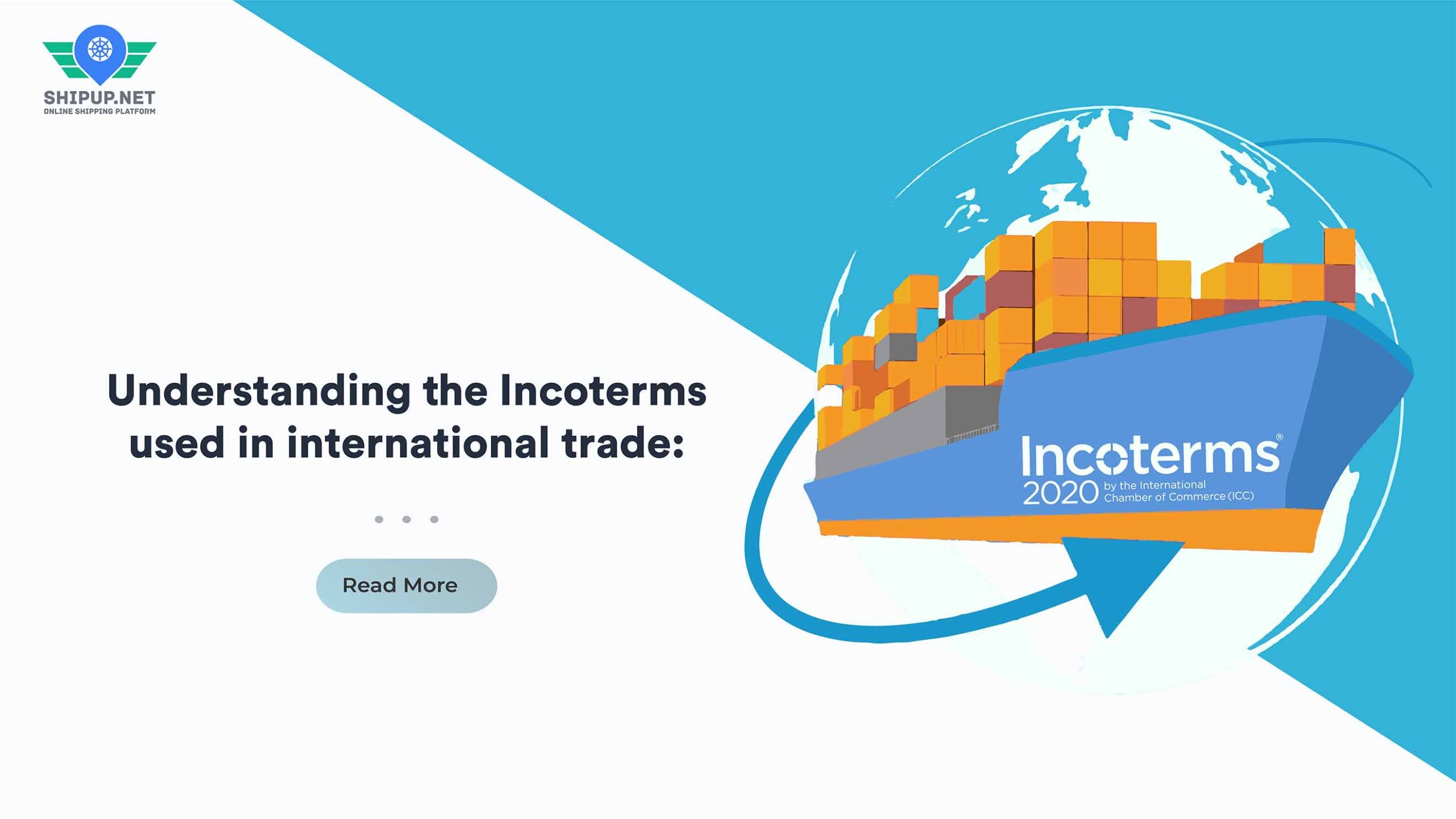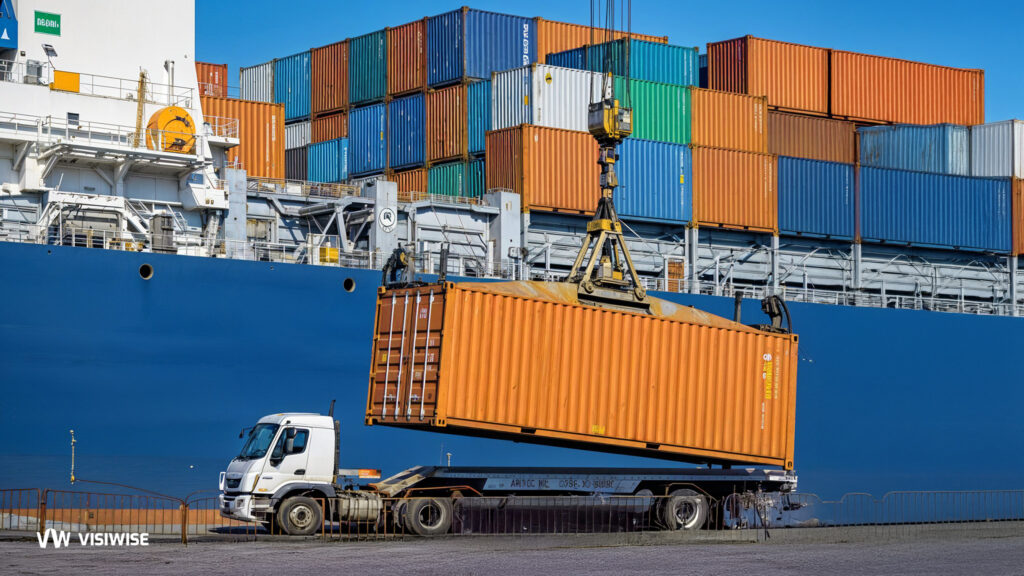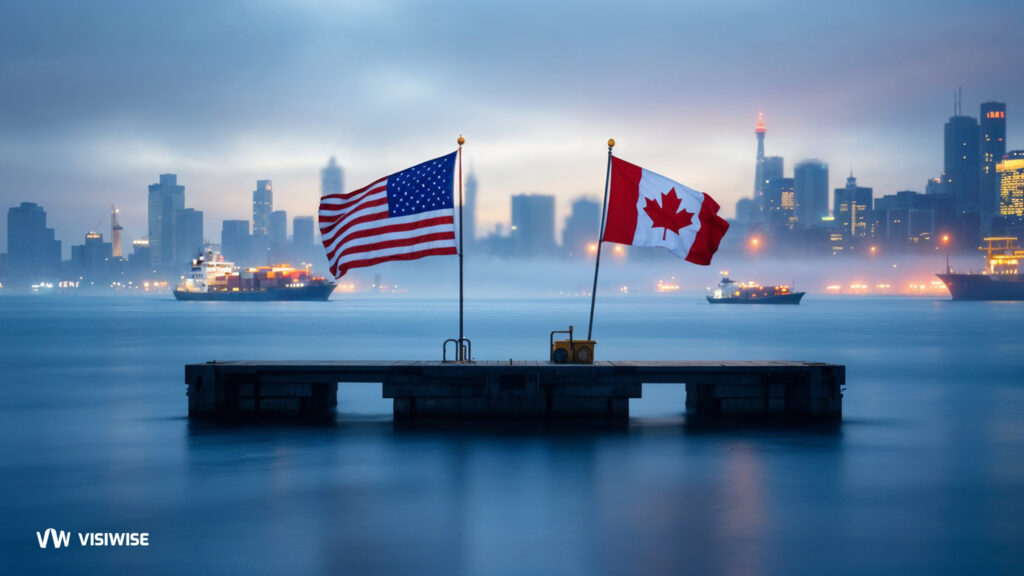In today’s global economy, international trade has become more prevalent than ever before. With the rise of cross-border commerce, it’s important to understand the various rules and guidelines that govern these transactions. That’s where Incoterms come in. Developed by the International Chamber of Commerce (ICC), Incoterms provide a universal set of rules and guidelines that help facilitate trade by providing a common language for buyers and sellers to set the terms of their trades.
In this blog post, we’ll dive into the world of Incoterms and explore the different types of rules and features that they provide. We’ll also take a closer look at the changes introduced in the Incoterms 2020 rules. From understanding the classification of Incoterms to learning the basic features of those used for all modes of transport, as well as those used only for sea and inland waterway transport, this post will provide you with a comprehensive overview of everything you need to know about Incoterms.
Whether you’re a buyer, seller, or logistics professional involved in international trade, understanding Incoterms is essential for ensuring smooth and efficient trade transactions. So, let’s get started and explore the fascinating world of Incoterms in international trade.
Understanding the Classification of Incoterms
To understand Incoterms, it’s important to know their classification. The Incoterms are divided into four principal categories: E, F, C, and D. Each category contains a set of trade terms that provide specific guidelines and rules for international trade.
Category E contains only one trade term, which is EXW (Ex Works). This term means that the seller fulfills their obligation to deliver the goods by making them available at their premises. The buyer is responsible for all costs and risks associated with the transport of the goods.
Category F, also known as "Main Carriage Unpaid," contains three trade terms: FCA (Free Carrier), FAS (Free Alongside Ship), and FOB (Free on Board). These terms are used when the buyer arranges the main carriage of the goods. The seller is responsible for delivering the goods to a carrier or a port, but the buyer is responsible for all costs and risks associated with the transport of the goods.
Category C, also known as "Main Carriage Paid," contains four trade terms: CPT (Carriage paid to), CIP (Carriage and Insurance paid to), CFR (Cost and Freight), and CIF (Cost, Insurance, and Freight). These terms are used when the seller arranges the main carriage of the goods. The seller is responsible for delivering the goods to a carrier or a port and for paying the costs and risks associated with the transport of the goods up to the named place of destination.
Category D, also known as "Arrival," contains three trade terms: DAP (Delivered at Place), DPU (Delivered at Place Unloaded), and DDP (Delivered Duty Paid). These terms are used when the seller is responsible for delivering the goods to the named place of destination and for paying all costs and risks associated with the transport of the goods.
In addition to the above-mentioned categories, Incoterms can also be classified according to the means of transportation. Incoterms for any mode of transport include EXW, FCA, CPT, CIP, DPU, DAP, and DDP. Incoterms only for sea and inland waterway transport include FAS, FOB, CFR, and CIF.
Each Incoterm contains a set of rules of interpretation for the obligations of both the seller and the buyer, covering various issues such as general obligations, delivery, transfer of risks, carriage, insurance, delivery/transport documents, export/import clearance, checking/packaging/marking, allocation of costs, and notices.
EXW Incoterm (Ex Works)
Understanding Incoterms is crucial when engaging in international trade, as they dictate the responsibilities of the buyer and seller regarding delivery, insurance, and costs. One such Incoterm is EXW (Ex Works), which is considered the most basic of all trade terms. In an EXW transaction, the seller is only required to deliver the goods to the buyer at a named place of delivery, usually the seller’s place of business. The seller is not responsible for loading the goods onto any specific vehicle or clearing the goods for export.
Until the goods are delivered as specified in the sale contract, the seller bears all risks of loss or damage to the goods. After delivery, the buyer assumes responsibility for the goods and any costs associated with them. This means that if the goods are damaged during transit or while being loaded, the seller is liable for any losses, whereas if the goods are damaged after delivery, the buyer bears the risk.
EXW is often used for domestic trade rather than international trade. It is commonly used in courier shipments where the courier picks up the shipment from the client’s premises and loads the courier’s own truck. Payment terms for EXW transactions are generally cash in advance and open account. In cases where the parties wish to extend the liability to loading operations, they may insert the term "loaded" following the reference to EXW in their sales contract. However, without further clarification, it is difficult to determine whether the term means "loaded at the seller’s risk" or "loaded at the buyer’s risk."
In summary, the EXW Incoterm is best suited for domestic trade, as it places minimal obligations on the seller. It is important to note that until the goods are delivered as specified in the sale contract, the seller bears all risks of loss or damage to the goods, and after delivery, the buyer assumes responsibility. Parties can extend the liability to loading operations by inserting the term "loaded" into their sales contract, but it is important to clarify the meaning of the term to avoid disputes.
FCA Incoterm (Free Carrier)
The FCA Incoterm, which stands for Free Carrier, defines the delivery of goods in two ways, depending on whether the named place of delivery is the seller’s premises or elsewhere. When the delivery is at the seller’s premises, the goods are deemed to be delivered when they are loaded on the transportation vehicle arranged by the buyer. On the other hand, if the delivery is at a warehouse or factory, the goods are deemed delivered when they are loaded on the seller’s transportation vehicle, reach the named place, are ready for unloading from the seller’s transportation vehicle, and are placed at the disposal of the carrier nominated by the buyer.
In terms of the carrier, it is usually a firm that transports goods or passengers for hire, but it can also be any person who, by contract, undertakes to perform or procure such services. The FCA Incoterm requires the buyer to nominate the carrier, and the seller must place the goods at the disposal of the carrier. The carrier’s responsibilities include the transportation of the goods to the destination and the issuance of the transport document, which is usually a bill of lading.
In 2020, new obligations were added to the FCA Incoterm. For instance, the parties may agree that the buyer instructs the carrier to issue the transport document with the on-board notation to the seller. The seller, in turn, undertakes to send this document to the buyer, who will need it to obtain discharge of the goods from the carrier. The FCA Incoterm also requires the seller to clear the goods for export, where applicable. However, the seller has no obligation to clear the goods for import, and no insurance obligation is placed on either the seller or the buyer.
In summary, the FCA Incoterm is a flexible option for both domestic and international trade. The delivery of goods is dependent on the named place of delivery, and the carrier’s responsibilities are defined by the contract between the parties. With the addition of new obligations in 2020, the FCA Incoterm provides greater clarity and control to both the buyer and the seller, making it a popular choice in commercial transactions.
CPT Incoterm (Carriage Paid to)
The CPT Incoterm (Carriage Paid to) is a trade term that defines the obligations of the seller and buyer in a transaction where the seller is responsible for the carriage of the goods to the place of destination. Under CPT, the delivery of goods takes place when the seller delivers the goods to the carrier at the agreed place or procures them for delivery. The seller has the responsibility to contract, at its own expense, for the carriage of the goods from the point of delivery to the destination. The transfer of risk from the seller to the buyer takes place when the goods are handed over to the carrier, and the existence of the contract of carriage has no impact on this transfer.
If the seller incurs costs related to unloading of goods at the place of destination under the contract of carriage, it must bear them unless otherwise agreed. However, the seller has no obligation to clear the goods for import. The buyer and the seller are not required to conclude an insurance contract.
In summary, the CPT Incoterm is appropriate for transactions where the seller assumes responsibility for the carriage of goods to the place of destination. The seller is required to contract for the carriage of the goods and is responsible for any costs associated with the unloading of the goods at the destination. The transfer of risk takes place when the goods are handed over to the carrier, and the seller is responsible for clearing the goods for export, where applicable. However, neither the seller nor the buyer is required to conclude an insurance contract.
CIP Incoterm (Carriage and Insurance Paid to)
The CIP Incoterm, or Carriage and Insurance Paid to Incoterm, is similar to the CPT Incoterm in that the seller is responsible for delivering the goods to the carrier at the agreed place and clearing the goods for export. However, in addition to these obligations, the seller is also required to contract for insurance to cover the buyer’s risk or damage to the goods from the place of delivery to the destination.
The insurance coverage required for CIP Incoterm must be made in conformity with Clauses (A) of the Institute Cargo Clauses or similar clauses, and it must cover the contractual price of the goods plus at least 10%. Prior to the 2020 revision of the Incoterms, only a minimum insurance coverage pursuant to Clauses (C) of the Institute Cargo Clauses was required. However, it is still possible for the parties to agree on a lower coverage if they so choose. Once the insurance is contracted, the seller must provide the insurance policy or certificate to the buyer.
By using the CIP Incoterm, the buyer can be assured that the goods will be covered by insurance during transport, which can be particularly important for high-value or fragile items. However, it is important to note that the insurance only covers the goods during transport and not any potential damage or loss that may occur after the goods have been delivered to the buyer. Additionally, the CIP Incoterm does not require the seller to bear any costs related to unloading the goods at the place of destination unless otherwise agreed upon by the parties.
DAP Incoterm (Delivered at Place)
The DAP Incoterm, which stands for Delivered at Place, is used when the seller doesn’t want to bear the cost and risk of unloading the goods. Under DAP, the seller is responsible for delivering the goods to the buyer at the agreed place of destination. The goods are considered to be delivered when they are put at the disposal of the buyer on the transportation vehicle, ready for unloading at the agreed-upon place. The place of delivery and the place of destination are the same under the DAP Incoterm.
The seller is required to contract for the carriage of the goods or arrange for it to be done at their own expense, and they must also clear the goods for export. However, they are not responsible for unloading the goods from the transportation vehicle at the destination. This obligation falls on the buyer. The seller is also not required to subscribe to an insurance contract, and neither is the buyer.
Since the place of delivery and the place of destination are the same under the DAP Incoterm, the seller bears the risk of the goods until they are put at the disposal of the buyer. Once the
goods are at the disposal of the buyer, the risk transfers to the buyer. It’s important for both parties to clearly define the place of destination to avoid any misunderstandings or disputes.
In summary, the DAP Incoterm is a good option when the seller doesn’t want to bear the cost and risk of unloading the goods and the buyer is willing to take on that responsibility. The seller is responsible for delivering the goods to the agreed place of destination, but they are not required to unload the goods or purchase insurance. The buyer takes on the risk of the goods once they are put at their disposal on the transportation vehicle.
DPU Incoterm (Delivered at Place Unloaded)
The DPU Incoterm, which stands for Delivered at Place Unloaded, is a new feature of the 2020 Incoterms that replaced the DAT Incoterm established under the 2010 Incoterms. This Incoterm requires the seller to unload the goods at the destination, which makes it the only Incoterm that has this obligation. The delivery of the goods occurs when the goods are unloaded from the transportation vehicle and made available to the buyer at the agreed place of destination. The place of delivery and the place of destination are the same under the DPU Incoterm, meaning that the seller bears the risk until the goods are unloaded at the destination.
The seller is obligated to arrange or conclude a contract for the carriage of the goods, as well as to clear the goods for export. The buyer is required to assist the seller in obtaining the necessary documentation for export clearance formalities, but at the seller’s expense. However, there is no such obligation for import. The seller must ensure that the goods are unloaded at the destination, but there is no requirement for the seller or the buyer to subscribe to an insurance contract.
Overall, the DPU Incoterm offers a compromise for the seller and buyer. The seller has an obligation to unload the goods at the destination while the buyer assists with the necessary documentation for export clearance formalities. There is no requirement for insurance under this Incoterm, which may result in lower costs for both parties.
DDP Incoterm (Delivered Duty Paid)
The DDP Incoterm (Delivered Duty Paid) is an international trade term used in the sale of goods between buyers and sellers. Under DDP, the seller is responsible for delivering the goods to the buyer’s destination, ready for unloading, and clearing them for import. The seller bears the maximum responsibility and risk for the goods until they are delivered to the buyer.
Once the goods arrive at the buyer’s destination, the seller must unload them and ensure they are cleared for import. The seller must also ensure that the goods are delivered to an agreed point within the destination, if any. The seller is responsible for all the costs and risks associated with delivering the goods to the buyer, including any import duties or taxes.
Under the DDP Incoterm, the seller is also responsible for arranging the transportation of the goods and obtaining all necessary export and import documentation. However, the buyer is responsible for assisting the seller in obtaining any documentation necessary for export clearance. Unlike other Incoterms, the DDP Incoterm does not require the seller to contract for insurance.
In summary, the DDP Incoterm places the maximum responsibility on the seller for delivering the goods to the buyer, including import clearance and all associated costs and risks. The buyer is only responsible for unloading the goods at the destination and assisting the seller in obtaining any necessary export clearance documentation. Unlike some other Incoterms, the DDP Incoterm does not require the seller to contract for insurance.
FAS Incoterm (Free Alongside Ship)
The FAS Incoterm, or Free Alongside Ship, is a term used in international trade to define the seller’s responsibilities when delivering goods to a buyer. According to FAS, the seller delivers the goods when it places them alongside the ship or vessel nominated by the buyer at the named port of shipment or procures the goods so delivered. Once the goods are alongside the ship, the risk or damage to the goods is transferred from the seller to the buyer.
Unlike some other Incoterms, the FAS Incoterm does not require the seller to conclude a contract of carriage. Instead, the buyer bears all expenses related to the carriage of the goods from the named port of shipment. Therefore, this Incoterm may not be suitable if the goods are to be handed over to the carrier at a container terminal before they are placed alongside the ship. In such cases, other Incoterms, such as the above-mentioned FCA term, may be more appropriate.
The seller under the FAS Incoterm is required to clear the goods for export but not for import. The seller is not required to conclude any insurance. It is important to note that FAS Incoterm applies only to maritime transport and cannot be used for other modes of transport. It is also worth noting that the FAS Incoterm is not recommended for use in modern commercial practices, and the FCA Incoterm is often used as a better alternative.
FOB Incoterm (Free on Board)
FOB stands for "Free On Board," which means that the seller delivers the goods by placing them on board the ship nominated by the buyer at the named port of shipment. Once the goods are on the ship, the risk of loss or damage is transferred to the buyer. The seller only needs to clear the goods for export, not import.
It’s important to note that the FOB Incoterm does not require the seller to conclude a contract of carriage. This means that the buyer is responsible for all expenses related to the carriage of goods from the named port of shipment. So, if you’re the buyer, be prepared to cover all those costs!
Another thing to keep in mind is that the FOB Incoterm doesn’t require the seller or the buyer to conclude an insurance contract. This is different from some other Incoterms, such as CIF or CIP, which do require insurance. So, if you’re the seller or the buyer, you’ll need to consider whether you want to purchase insurance separately to protect against any potential losses.
In summary, the FOB Incoterm is a popular choice for international trade because it clearly defines the responsibilities of the seller and the buyer. Just remember, if you’re the buyer, you’ll need to cover the costs of getting the goods from the port of shipment to their final destination, and you might want to consider purchasing insurance separately to protect against any losses.
CFR Incoterm (Cost and Freight)
Imagine you’re planning to ship a load of your amazing products to a customer overseas. You want to make sure you understand the different options available to you for shipping and delivery, so you can choose the best one for your needs. One option you might consider is the CFR Incoterm.
Under the CFR Incoterm, the seller (that’s you!) is responsible for delivering the goods by placing them on board the ship or by arranging for someone else to do it. However, the buyer assumes the risk of any loss or damage to the goods once they are placed on board the vessel at the port of delivery. So, you’ll want to make sure your products are well-packaged and protected for the journey to their destination.
It’s important to note that while the risk of loss or damage is transferred to the buyer at the port of delivery, the seller still has an obligation to conclude a contract of carriage for the goods until they reach the port of destination. The seller is also responsible for covering any costs associated with unloading the goods at the port of destination, unless the buyer agrees to take on those costs. Finally, the seller is responsible for clearing the goods for export but not for import.
When considering the CFR Incoterm, it’s important to weigh the potential benefits and drawbacks for your particular situation. On the one hand, this option may be more cost-effective since the buyer assumes the risk of loss or damage to the goods once they’re on board the ship. On the other hand, you’ll want to be sure that you have a reliable and trustworthy carrier to transport your goods to their destination, since you’ll still be responsible for arranging and paying for the transportation.
CIF Incoterm (Cost, Insurance and Freight)
Under the CIF Incoterm, the seller is responsible for delivering the goods by placing them on board the ship or arranging for their delivery. Just like the CFR Incoterm, the transfer of risk takes place at the port of delivery, and the seller must conclude a contract of carriage of the goods until the port of destination. Additionally, the seller must clear the goods for export, not import, and bear all costs related to unloading at the port of destination, unless agreed otherwise.
But what sets the CIF Incoterm apart is the requirement for the seller to obtain insurance covering against the buyer’s risk of loss or damage to the goods from the port of shipment to the port of destination. The seller is required to obtain a minimum insurance coverage based on the Institute Cargo Clauses or other clauses, as opposed to the CIP Incoterm, that requires a higher level of coverage. This means that the buyer can rest assured that their goods are protected during transit.
It’s important to note that the seller is responsible for obtaining the insurance, but the buyer will be responsible for paying the insurance premium. With this understanding, both the seller and the buyer can effectively negotiate the terms of the contract and ensure that they are comfortable with the level of insurance coverage provided.
In summary, the CIF Incoterm is similar to the CFR Incoterm in terms of the delivery of goods, but with the added requirement for insurance coverage by the seller. This means that the buyer can feel secure in the knowledge that their goods are protected during transit, and the seller can negotiate the level of coverage to ensure they are not taking on excessive risk.



